The EU cannot put food security at risk when considering imposing new environmental rules on farmers, European Commissioner for Agriculture Janusz Wojciechowski has told the Irish Farmers Journal.
It must instead beef up the CAP budget and take the legitimate concerns of farmers on board in formulating the laws it will use to steer farmers towards the targets set out in the Farm to Fork strategy.
“My position in the Commission is that we should very seriously consider farmers’ concerns and avoid the risk of impacting food security,” the Polish commissioner told the Irish Farmers Journal.
The Commissioner highlighted three big EU policy developments outside of the CAP that will concern Irish farmers: a new nature restoration law, a stricter industrial emissions directive and a new sustainable use of pesticides regulation (SUR).
These rules and regulations will give a legal backing to EU environmental targets laid out in the Green Deal and Farm to Fork strategies.
Each will need to be carefully examined to make sure that imposing them will not have any significant impacts on food security both in the EU and globally, he maintained, claiming that he will stick up for farmers around the negotiating table in Brussels.
“Full impact assessment is needed in deciding about regulations that affect the farmers. This is my very strong position; we should avoid initiatives that create a risk for food security.”
When asked about the impact that the 2023-2027 CAP and already agreed environmental targets will have on farm output, Commissioner Wojciechowski claimed that the intention has never been to cut production. Flexibility will be granted if output is seen to fall.
“The intention of our reform is not to reduce agricultural production,” he said.
“Because Russia has experience in using food – the lack of food – as a weapon, we must produce food in the European Union.
“We must be self-sufficient on food and be ready to deliver to regions of the world where there is a lack of food.
“If there is a risk to the productivity of agriculture when we monitor the introduction of the strategic plans, if there is a risk to food security, we will react. The strategic plans can be changed. There is flexibility.
“It was an achievement of the CAP that we found a balanced approach and many environmental targets are not mandatory for farmers, like increasing organic farms, reducing fertilisers and other reductions – on the pesticides, it is a different question.”
Last week, the Irish Farmers Journal was told by the Commission that it is set to roll back on its plans to ban all crop sprays in Ireland under the SUR after EU farm ministers voiced significant concerns on the proposal.
The Commission will issue a report in December 2023 to assess the “collective ambition” of all CAP strategic plans towards EU Green Deal targets.
From 2024 onwards, all EU countries are to update Brussels on their progress through implementing their plans.
CAP cash
The farm commissioner stressed that policymakers would face an uphill battle to raise the CAP budget to a sufficient level that will allow for farmers to be incentivised to implement voluntary environmental measures.
Commissioner Wojciechowski recounted that the most recent CAP reform had been a struggle just to maintain budgets.
Germany, Austria and Sweden were among the member states that were seeking to push CAP spending down during the negotiations for the 2023-2027 CAP, while policymakers in others states, like Ireland, Poland and France, had sought to keep the envelope from shrinking.
“Some member states were in very strong opposition to the EU budget, including the agriculture budget,” the commissioner went on.
“And, in the future, we must achieve a better understanding that 0.4% of EU GDP for CAP, for food security, is not enough. I understand the concerns of farmers.”
He also said that farmer frustration with being asked to do more to receive their slice of CAP funds was understandable.
“Generally, yes. I understand the farmers’ concerns and we need a stronger budget for agriculture to ensure food security in the long-term perspective.”

It could be organics or bust for many of the EU's smaller farmers, the commissioner warned. \ Donal O'Leary
The commissioner suggested that converting to organics can act as a lifeline to smaller farmers across the EU, with the overall number of farmers in the EU taking a 40% tumble since 2000.
Organic supports and the reprieve from record fertiliser costs can save farmers otherwise destined to leave the sector, the Commissioner told the Irish Farmers Journal.
“There are many farmers who have the choice of being an organic farmer or not being a farmer, to stop farming,” he continued.
“We lost 3m farms in the EU over one decade, over 800 farms per day. This is not the case in Ireland because the decrease was only 7%. Compared with the rest of Europe, this is OK.
“But now we have more support for organic farming, I hope that we will achieve positive results. The option to transition to organic will help to reduce the negative trend in the number of farms.”
This is a good direction, especially for small farmers and should be continued
On Ireland’s figures, Commissioner Wojciechowski said that although the organic sector is still relatively small, the area under organics had more than doubled since 2013.
“This is a good direction, especially for small farmers and should be continued.”
He stated that more has to be done for organics than just seeking an increase in organic areas, particularly in developing organic markets and consumer demand.

The commissioner recognised Ireland's ability to specialise in beef and dairy.
When Commissioner Wojciechowski was pressed on whether the emphasis he places on increasing the number of mixed farms is applicable to Ireland, he recognised that specialising production of certain farm goods, like dairy and beef, can make sense.
“The production of milk in Ireland is 1,800l per capita per year. OK, this is specific to Irish agriculture, Irish farmers are very productive,” Wojciechowski responded.
“This is a question of the natural conditions and geography, there are long traditions for such farming. This is very important and we should support the farmers to continue their ways of production.”
He then re-emphasised that the objective of the EU’s Farm to Fork policy was not to reduce farm output.
“There are no ideas to reduce livestock in Ireland. There is no target to reduce overall production.”
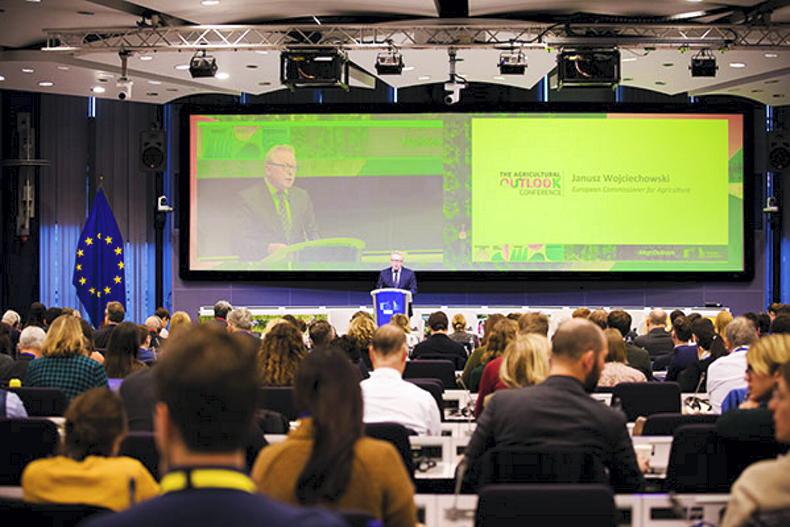
EU farm output is expected to fall over the next 10 years, Wojciechowski told the EU Agricultural Outlook conference last week.
Commissioner Wojciechowski stated the EU must re-evaluate the way it deals with crises in the farming sector. However, he suggested that emergency state aid schemes taken at national level are not the long-term answer to coping with crises.
“Crisis management is very important. We do not have enough instruments in the CAP budget to support farmers in crisis situations,” the commissioner explained.
“The crisis reserve of €500m is not enough and we use State aid, but this isn’t a good solution.
“In a longer perspective, this has a negative impact on the common market and for the equal treatment of all member states because not all member states have the same opportunity to use State aid.”
The European Commission’s communication to member states on what measures they can implement to help farmers dealing with fertiliser cost and availability challenges into 2023 had to be considered “taking into account our competences, our budget,” he said.
Who is Janusz Wojciechowski?
2019 to present: European Commissioner for Agriculture.2016 to 2019: Poland’s appointee to the European Court of Auditors.2014 to 2016: MEP for Poland.1990 to 1995: member of Polish parliament.Commissioner Wojciechowski has also sat as a judge at regional court, Supreme Court and High Court of Justice level in his native Poland.
The EU cannot put food security at risk when considering imposing new environmental rules on farmers, European Commissioner for Agriculture Janusz Wojciechowski has told the Irish Farmers Journal.
It must instead beef up the CAP budget and take the legitimate concerns of farmers on board in formulating the laws it will use to steer farmers towards the targets set out in the Farm to Fork strategy.
“My position in the Commission is that we should very seriously consider farmers’ concerns and avoid the risk of impacting food security,” the Polish commissioner told the Irish Farmers Journal.
The Commissioner highlighted three big EU policy developments outside of the CAP that will concern Irish farmers: a new nature restoration law, a stricter industrial emissions directive and a new sustainable use of pesticides regulation (SUR).
These rules and regulations will give a legal backing to EU environmental targets laid out in the Green Deal and Farm to Fork strategies.
Each will need to be carefully examined to make sure that imposing them will not have any significant impacts on food security both in the EU and globally, he maintained, claiming that he will stick up for farmers around the negotiating table in Brussels.
“Full impact assessment is needed in deciding about regulations that affect the farmers. This is my very strong position; we should avoid initiatives that create a risk for food security.”
When asked about the impact that the 2023-2027 CAP and already agreed environmental targets will have on farm output, Commissioner Wojciechowski claimed that the intention has never been to cut production. Flexibility will be granted if output is seen to fall.
“The intention of our reform is not to reduce agricultural production,” he said.
“Because Russia has experience in using food – the lack of food – as a weapon, we must produce food in the European Union.
“We must be self-sufficient on food and be ready to deliver to regions of the world where there is a lack of food.
“If there is a risk to the productivity of agriculture when we monitor the introduction of the strategic plans, if there is a risk to food security, we will react. The strategic plans can be changed. There is flexibility.
“It was an achievement of the CAP that we found a balanced approach and many environmental targets are not mandatory for farmers, like increasing organic farms, reducing fertilisers and other reductions – on the pesticides, it is a different question.”
Last week, the Irish Farmers Journal was told by the Commission that it is set to roll back on its plans to ban all crop sprays in Ireland under the SUR after EU farm ministers voiced significant concerns on the proposal.
The Commission will issue a report in December 2023 to assess the “collective ambition” of all CAP strategic plans towards EU Green Deal targets.
From 2024 onwards, all EU countries are to update Brussels on their progress through implementing their plans.
CAP cash
The farm commissioner stressed that policymakers would face an uphill battle to raise the CAP budget to a sufficient level that will allow for farmers to be incentivised to implement voluntary environmental measures.
Commissioner Wojciechowski recounted that the most recent CAP reform had been a struggle just to maintain budgets.
Germany, Austria and Sweden were among the member states that were seeking to push CAP spending down during the negotiations for the 2023-2027 CAP, while policymakers in others states, like Ireland, Poland and France, had sought to keep the envelope from shrinking.
“Some member states were in very strong opposition to the EU budget, including the agriculture budget,” the commissioner went on.
“And, in the future, we must achieve a better understanding that 0.4% of EU GDP for CAP, for food security, is not enough. I understand the concerns of farmers.”
He also said that farmer frustration with being asked to do more to receive their slice of CAP funds was understandable.
“Generally, yes. I understand the farmers’ concerns and we need a stronger budget for agriculture to ensure food security in the long-term perspective.”

It could be organics or bust for many of the EU's smaller farmers, the commissioner warned. \ Donal O'Leary
The commissioner suggested that converting to organics can act as a lifeline to smaller farmers across the EU, with the overall number of farmers in the EU taking a 40% tumble since 2000.
Organic supports and the reprieve from record fertiliser costs can save farmers otherwise destined to leave the sector, the Commissioner told the Irish Farmers Journal.
“There are many farmers who have the choice of being an organic farmer or not being a farmer, to stop farming,” he continued.
“We lost 3m farms in the EU over one decade, over 800 farms per day. This is not the case in Ireland because the decrease was only 7%. Compared with the rest of Europe, this is OK.
“But now we have more support for organic farming, I hope that we will achieve positive results. The option to transition to organic will help to reduce the negative trend in the number of farms.”
This is a good direction, especially for small farmers and should be continued
On Ireland’s figures, Commissioner Wojciechowski said that although the organic sector is still relatively small, the area under organics had more than doubled since 2013.
“This is a good direction, especially for small farmers and should be continued.”
He stated that more has to be done for organics than just seeking an increase in organic areas, particularly in developing organic markets and consumer demand.

The commissioner recognised Ireland's ability to specialise in beef and dairy.
When Commissioner Wojciechowski was pressed on whether the emphasis he places on increasing the number of mixed farms is applicable to Ireland, he recognised that specialising production of certain farm goods, like dairy and beef, can make sense.
“The production of milk in Ireland is 1,800l per capita per year. OK, this is specific to Irish agriculture, Irish farmers are very productive,” Wojciechowski responded.
“This is a question of the natural conditions and geography, there are long traditions for such farming. This is very important and we should support the farmers to continue their ways of production.”
He then re-emphasised that the objective of the EU’s Farm to Fork policy was not to reduce farm output.
“There are no ideas to reduce livestock in Ireland. There is no target to reduce overall production.”

EU farm output is expected to fall over the next 10 years, Wojciechowski told the EU Agricultural Outlook conference last week.
Commissioner Wojciechowski stated the EU must re-evaluate the way it deals with crises in the farming sector. However, he suggested that emergency state aid schemes taken at national level are not the long-term answer to coping with crises.
“Crisis management is very important. We do not have enough instruments in the CAP budget to support farmers in crisis situations,” the commissioner explained.
“The crisis reserve of €500m is not enough and we use State aid, but this isn’t a good solution.
“In a longer perspective, this has a negative impact on the common market and for the equal treatment of all member states because not all member states have the same opportunity to use State aid.”
The European Commission’s communication to member states on what measures they can implement to help farmers dealing with fertiliser cost and availability challenges into 2023 had to be considered “taking into account our competences, our budget,” he said.
Who is Janusz Wojciechowski?
2019 to present: European Commissioner for Agriculture.2016 to 2019: Poland’s appointee to the European Court of Auditors.2014 to 2016: MEP for Poland.1990 to 1995: member of Polish parliament.Commissioner Wojciechowski has also sat as a judge at regional court, Supreme Court and High Court of Justice level in his native Poland.







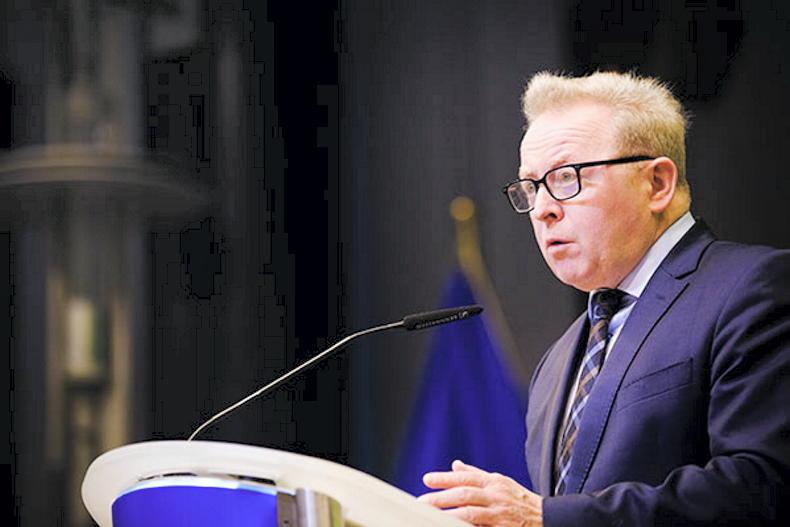
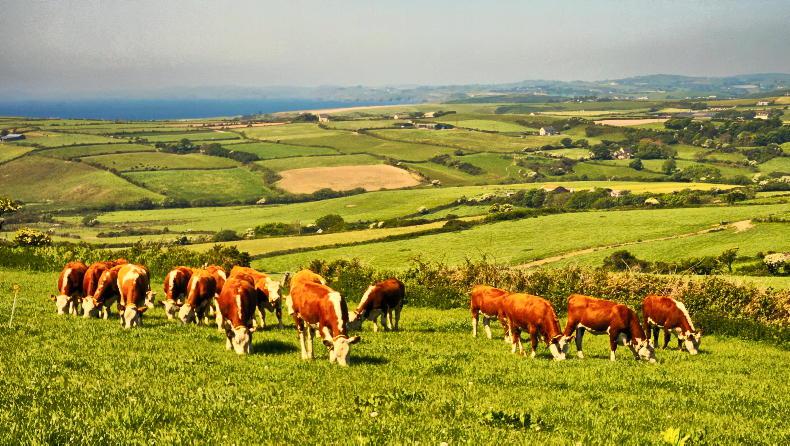


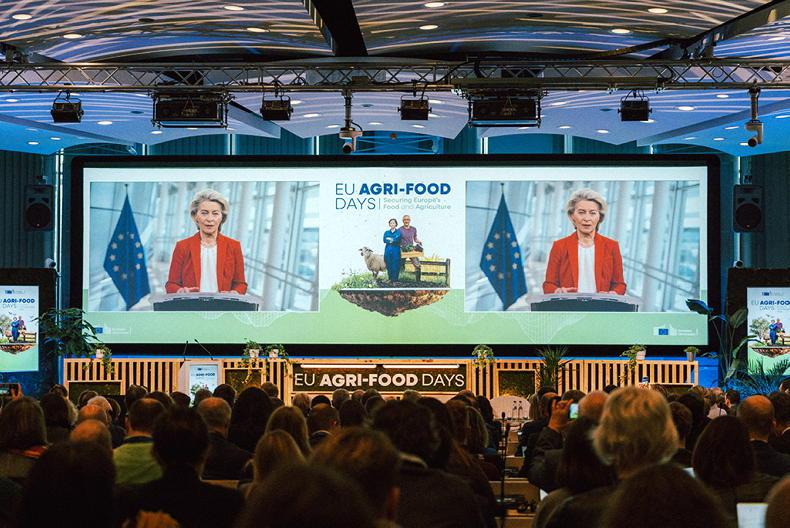
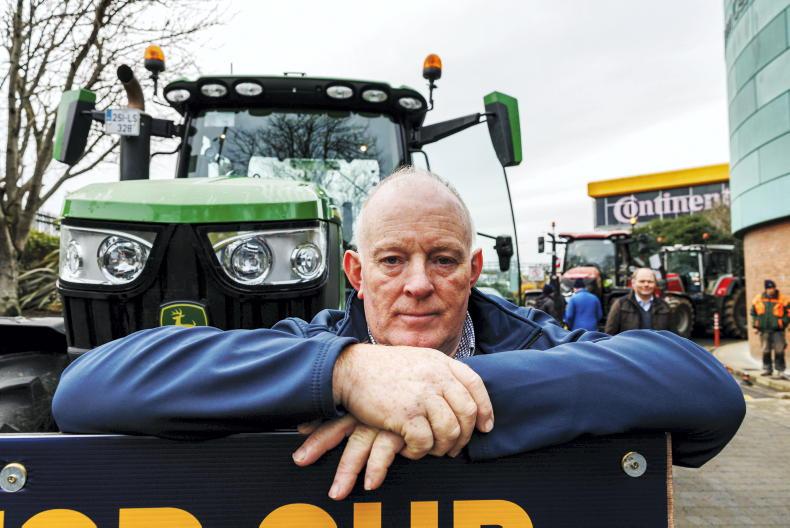
SHARING OPTIONS